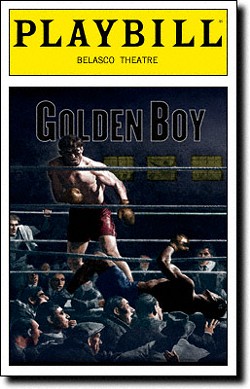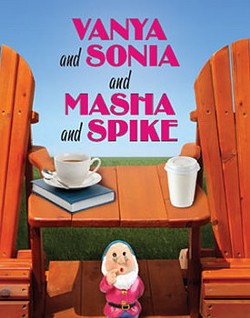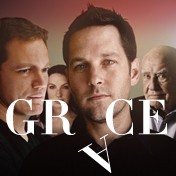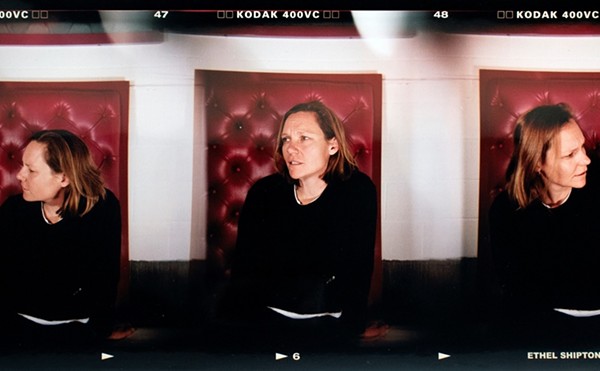Well, The Wicked Stage has fallen woefully behind. Yes, I still have theater reports on Madrid and Los Angeles in my hopper, but I plead (as my friends and colleagues know too well) that I really should be writing my #@$#* book. But as the year winds down, I find that I simply have to report on a weekend of binge theater-going in NYC: because of Broadway’s special holiday schedule, I was able to take in six shows in three days--which is insane, even for me!
The upside, though, is that my theater-reportage falls neatly into groups of three. Hands down the best things I saw in NYC were handsome, gorgeously-mounted revivals of Golden Boy and The Mystery of Edwin Drood. While they couldn’t be more different in form—the one, a ’30s drama of disillusion, the other a musical-hall spoof of detective novellas—they were similar in their principal virtue: each nailed exactly the required style for the show. In Golden Boy, Clifford Odets dissects the American Dream through heightened, poetic language that nevertheless captures the grittiness of immigrant America: the plot centers on a second-generation Italian who can either pursue a career as a concert violinist or—somewhat improbably—as a welterweight prizefighter. Yes, the play is schematic: does our hero choose the Old World-ish, vaguely socialist values of harmony and concord or the New World imperative of cutthroat competition—of literally pummeling one’s way to the top? And yes, it’s old-fashioned: three sprawling acts, plenty of secondary characters, and a color palette that runs the gamut from grey to, er, brown. But in Bartlett Sher’s smashing production, it’s also beautiful and sincere and moving.
There’s not much hope that Golden Boy will ever tour: too big, too old-fashioned. But I feel fairly confident that Drood, by triple-threat composer, lyricist, and book-writer Rupert Holmes, will eventually hit the road. Adapted in tongue-in-cheek style from Dickens’ last, unfinished novel, Scott Ellis’ Drood is a delight: a full-out music hall farce with plenty of mugging, terrible puns, glorious singing, and excellent performances by Stephanie J. Block, Will Chase, and even—there is a god in Heaven—Chita Rivera. (In addition, a ridiculous sound gag in the first act extracted from me the heartiest laugh I’ve had in a theater in months.) I suspect this will be the hottest new ticket in NYC until Matilda opens this spring.
Lincoln Center presents Christopher Durang’s latest piece, an oddly endearing mash-up of Chekhov entitled Vanya and Sonia and Masha and Spike. A word of warning: the play leans heavily on ol’ Anton, so if you don’t know your Seagull from your Cherry Orchard, I can’t imagine you would much understand (much less enjoy) this riff on Russian melancholia. But if Chekhov’s your bag, there’s a lot to enjoy here, as characters from various Chekhov plays collide in a wooded estate in rural Pennsylvania. Sigourney Weaver chews up the scenery as temperamental actress Masha; David Hyde Pierce takes on Vanya (though I saw the production with his excellent understudy, Keith Reddin). It’s not exactly the most tightly plotted thing I’ve ever seen on stage—parts of it reminded me of Durang’s shorter but nevertheless devastating parody of Tennessee Williams, For Whom the Southern Belle Tolls—but it’s amusing enough. Thumbs up.
A starry cast populates the revival of Inge’s Picnic but the production is ultimately sunk by a terrible miscalculation: the star-crossed leads are played by actors far better known for their work on TV than on the stage (Maggie Grace, from Lost, and Sebastian Stan, from Gossip Girl). Now, I’ve nothing against film stars per se: I’ve seen some good performances in the right role and in the right play (Debra Winger in How I Learned to Drive, for instance). But Picnic is all about subtext—I mean, even the pivotal picnic happens off-stage—and neither Grace nor Stan can put over the simmering undercurrents of repression and longing required by the script. In Sam Gold’s uneven production, Elizabeth Marvel does manage to capture the troubling essence of Inge; but she’s too little, too late for this static production. Picnic is still in previews; but I suspect the critics will descend like ants.
Two new plays—by Craig Wright and Sharr White—play with form. (I particularly enjoy playwrights who toy with the very shape of narrative; linearity is so last century.) Of the two, Wright’s experiment—Grace—works better, since form is gracefully wedded to content: the play concerns two Christian real estate developers who befriend a wounded soul—and possible investor—in sunny Florida. The play literally begins with a bang—a murder-suicide—but then Wright runs things backward, then forward again, as we see crucial scenes unspool themselves in little epicycles of circularity. The point—I think—is that “divine causality” is just another name for the narratives we all create and promulgate; I’m not sure that this thesis holds up to metaphysical scrutiny, but at least Wright is trying something new, and weird, and different. There’s excellent work by Paul Rudd, Kate Arrington, Michael Shannon, and Ed Asner; Dexter Bullard directs.
Less successful is Sharr White’s The Other Place, a transfer from off-Broadway. I understand why it transferred: Laurie Metcalf is terrific as a pharmaceutical researcher who fears she is haunted by visions of a mysterious, bikini-clad girl. But like the TV show Damages, the tension in the piece is created solely by form, as the mystery of the girl is ladled out in a number of flashbacks, culminating in a brilliant scenic reveal (by venerated designer Eugene Lee). But also like Damages, this is all sort of gimmicky: Damages without form is just another legal drama, and The Other Place, without its time-bending narrative, is, I fear, a lot like a movie-of-the-week. Director Joe Mantello pulls out all the stops—White couldn’t possibly hope for a better production—and between the fluid projections, the Swiss Army knife of a set, and the adept cast, it’s almost, but not quite, enough to make you forget that there’s really nothing particularly special about the plot. At just eighty-minutes, the play might make a good choice for one of San Antonio’s smaller theaters, however: I could see it sliding into the AtticRep’s season, for instance. It’s certainly a tour-de-force for an actress.
Well, that’s six shows up--and six down. I write this in Newark Airport en route to San Antonio: here’s hoping for plenty of good theater in 2013, in the Alamo City and elsewhere.
Your man in the trenches,
Thomas Jenkins


















